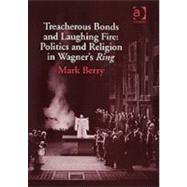Treacherous Bonds and Laughing Fire: Politics and Religion in Wagner's Ring
, by Berry,Mark- ISBN: 9780754653561 | 0754653560
- Cover: Hardcover
- Copyright: 5/9/2016
Mark Berry explores the political and religious ideas expounded in Wagner's Ring through close attention to the text and drama, the multifarious intellectual influences upon the composer during the work's lengthy gestation and composition, and the wealth of Wagner source material. Many of his writings are explicitly political in their concerns, for Wagner was emphatically not a revolutionary solely for the sake of art. Yet it would be misleading to see even the most 'political' tracts as somehow divorced from the aesthetic realm; Wagner's radical challenge to liberal-democratic politics makes no such distinction. This book considers Wagner's treatment of various worlds: nature, politics, economics, and metaphysics, in order to explain just how radical that challenge is. Classical interpretations have tended to opt either for an 'optimistic' view of the Ring, centred upon the influence of Young Hegelian thought - in particular the philosophy of Ludwig Feuerbach - and Wagner's concomitant revolutionary politics, or for the 'pessimistic' option, removing the disillusioned Wagner-in-Swiss-exile from the political sphere and stressing the undoubtedly important role of Arthur Schopenhauer. Such an 'either-or' approach seriously misrepresents not only Wagner's compositional method but also his intellectual method. It also sidelines inconvenient aspects of the dramas that fail to 'fit' whichever interpretation is selected. Wagner's tendency is not progressively to recant previous 'errors' in his oeuvre. Radical ideas are not completely replaced by a Schopenhauerian world-view, however loudly the composer might come to trumpet his apparent 'conversion'. Nor is Wagner's truly an Hegelian method, although Hegelian dialectic plays an important role. In fact, Wagner is in many ways not really a systematic thinker at all (which is not to portray him as self-consciously unsystematic in a Nietzschean, let alone 'post-modernist' fashion). His tendency, rather, is agglomerative, with ideas and influences overlapping. Indeed, the claim made sometimes that the Ring does not make sense touches upon an important truth in pointing towards the complexity of process. The claim errs, however, in failing to see Wagner's progression as one of self-criticism rather than incompetence. Questions and tentative solutions are tried and found wanting, leading to yet further attempts to reconcile political commitment, and the pessimistic religion seen in recognition of the nullity of the phenomenal world. The Ring, then, affords an extraordinary opportunity to grasp the richness and complexity of nineteenth-century thought and its underlying historical forces.







